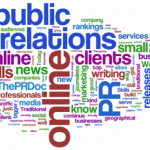The standard line today is that it’s best for brands to practice transparency as much as possible. Maybe, though, the largest brands can get away with not being transparent. Amazon made two significant policy changes in the first weeks of March and refused to say anything about them. Nike endured a few months of crisis prior to Colin Kaepernick with nary a public word. Was avoiding comment the right call?
Media Relations


Here’s What Should Go Into Your Influencer Agreement
March 12th, 2019 by Justin JoffeThat moment you’ve secured the first batch of influencers to promote your brand’s products, services or values is incredibly exciting. Partnering with people who can speak to what you do is an increasingly valuable media relations strategy whether your influencers are micro or macro. But with the Federal Trade Commission cracking down on influencers for not disclosing their partnerships and relationships, you’ve got to make sure that your contract, or influencer agreement, is clear in both language and expectations around disclosure.

Weird Neuroscience: Tips for Breaking Out at SXSW
March 8th, 2019 by Matthew Caiola, 5WPRGood news and bad news. One of the most anticipated events of the year, SXSW, begins today in Austin, Texas. Yet with thousands of brands from all over the world descending on the festival, how can your brand break through with it narrative? Neuroscience and deep research might hold the answers, argues 5WPR EVP Matthew Caiola.

March Madness PR Style: Young Pros Blast Lack of Clarity, Integration and Use of Data
March 1st, 2019 by Seth ArensteinWith March Madness permeating the zeitgeist in a few weeks, we asked some of the 2018 PR News Rising PR Stars to answer our roundtable questions this month. We asked, “What gets you mad about PR and communications?” And, “What can be done about it?” Their edited responses follow.

The Best Times to Pitch, Concerns About Influencer Scalability and PR’s 24/7 Pressure
March 1st, 2019 by Seth ArensteinA trio of new studies tell you the best time and day to pitch your stories to media, why scalability is a concern with influencers and a common concern among PR’s women and men.

7 Ways to Keep Your Press Release Out of the Garbage
February 13th, 2019 by Jim AlkonWhile technology and tactics have driven the evolution of the press release, perhaps the practice has been affected most by the way news is gathered and the way journalists and consumers process information: quickly and constantly. Here are some of the biggest changes and new considerations when engaging in the craft of press release writing.

The Number of Publications and Articles Rose in 2018 [INFOGRAPHIC]
February 12th, 2019 by Seth ArensteinWe know newsrooms are shrinking, but what about the media ecosystem? A study from AirPR shows it’s growing. There were more publications in 2018 than in 2017. And the number of articles published also grew last year vs 2017. Journalists on average published 78 percent more articles in 2018, though word counts declined. Most of the growth in publications and articles came from so-called tier 3 publications. These publications might work well for brands.

PR News Checklist: 3 Questions to Ask a Potential Agency Partner
February 6th, 2019 by Justin JoffeFor a brand with a small team and limited in-house resources, a strategic agency partnership can drastically widen your media relations efforts. It’s important to remember, though, that beyond an agency’s smooth veneer and talk must also be a proven track record. PR News spoke with some brand communicators to learn what they insist on asking when vetting an agency. Here are three questions that any agency should answer before you work with them.

Communicators Trade Tactics for Getting Bigger Budgets, Building Relationships with Media
February 1st, 2019 by Seth ArensteinPrior to PR News’ Media Relations Conference in December, PR News and partner PublicRelay, a media monitoring and analytics firm, convened a Communications Leadership

Should You Pitch Journalists on Social Media?
January 22nd, 2019 by Caitlin KellyYou can now find and reach almost anyone through social media, making it a quick and easy way to pitch. But should you? Likely, you’ll succeed only if you’re working on an important story that’s on a journalist’s beat. Here are some tips for getting it right.
